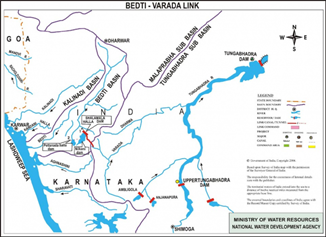

2nd August 2022 (8 Topics)
Context
The Union Ministry of Jal Shakti (water resources), under the ‘National Perspective Plan’, had called for proposals to transfer water from water surplus basins to water deficit basins
About
- National Water Development Agency (NWDA) had identified 30 links in the country that included 16 peninsular rivers.
- There were two sensitive proposals among the six Karnataka proposals.
- These were the Bedti-Dharma-Varada and Aghanashini-Varada river links.
About Bedti-Varada river inter-linking project:
- The Bedti-Varada project was envisaged in 1992 to supply drinking water.
- The plan aims to link the Bedti, a river flowing west into the Arabian Sea, with the Varada, a tributary of the Tungabhadra River, which flows into the Krishna, which in turn flows into the Bay of Bengal.
- A massive dam will be erected at Hirevadatti in Gadag district.
- A second dam will be built on the Pattanahalla River at Menasagoda in Sirsi, Uttara Kannada district.
- Both dams will take water to the Varada via tunnels.
- The pre-feasibility report of the ‘Bedti-Varada link proposal’ was submitted by NWDA in August 2021.
- It envisaged the diversion of 242 million cubic metres (mcm) from the Bedti Basin to the water-scarce Tungabhadra sub-basin to irrigate 60,200 hectares (ha) in the Tungabhadra Project command Area of Raichur district.
- The draft detailed project report (DPR) of the Bedti-Dharma-Varada link and the drawings submitted by NWDA to the Government of Karnataka in February 2022, cover parts of the Bedti-Conservation Reserve and Shalmala Riparian Conservation Reserve.
- These are in the Western Ghats, which is eco-sensitive and a biodiversity hotspot.

Implications of the project:
If the project is implemented:
- The livelihood of the people in the downstream areas will be adversely impacted and the flora and fauna at the estuary will be affected.
- Forest loss shall impair the hydrological cycle, monsoon pattern and climatological conditions in the donor as well in the recipient basins.
- There will be threats to endangered species.
- When the free annual flow of water in the river system is prevented, there will be on-land transgression of marine water in the coastal zone. This will cause impairment of the interface between fresh and marine water, resulting in an acute shortage of drinking water.
- Changes in land use will aggravate natural hazards like landslides, lead to loss of forest wealth, disturb wildlife and human lead of life.
- The additional storage of 524 mcm of water, to be diverted from the proposed project into the heavily silted Tungabhadra reservoir, does not sounds technically possible.
- It will aggravate further, the problem of water logging and soil salinity in the area already under irrigation from the Tungabhadra Project.
- The surface and groundwater resources of the donor basin will be severely affected (both) for irrigation and even drinking needs during lean season.


